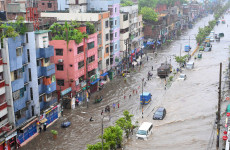MILLIONS OF PEOPLE in southern Bangladesh and eastern India have been left without power after a major tropical storm.
Tropical storm Remal has flooded dozens of coastal villages, destroying more than 35,000 homes and damaging 115,000 in Bangladesh.
The storm, which is now weakening, was one of the quickest-forming and longest-lasting seen in the region, according to Bangladesh weather experts.
The cyclone made landfall in Bangladesh and India on Sunday evening, bringing strong winds of at least 111 kilometres per hour and huge waves, killing at least 21 people.
Nearly 800,000 people in Bangladesh were evacuated from vulnerable areas on Sunday.
Locals repair an embankment damaged during Cyclone Remal in Khulna, Bangladesh on 27 May Alamy
Alamy
The capital, Dhaka, saw major flooding, as well as other towns, villages and cities, including the Cox’s Bazar area where more than one million Rohingya refugees from Myanmar live in dense, unstable shelters as they are not permitted to erect permanent structures.
In India’s, all schools in Kolkata were closed as heavy downpours flooded streets and homes in low-lying areas. Trees and electric poles were uprooted in some coastal parts of the West Bengal state and thatched roofs on homes were torn away by the winds.
Kolkata airport was shut on Sunday (but has since reopened) while Bangladesh closed the airport in Chattogram, the second-largest city in the country, and cancelled all domestic flights in and out of Cox’s Bazar.
Some cities received at least 200 millimetres (7.9 inches) of heavy rain during the storm.
India’s Meteorological Department has said the weather is likely to weaken throughout the day but warned of heavy showers over Assam and other north-eastern states for the next two days.
Climate change
Bangladesh weather experts said the deadly cyclone was one of the quickest-forming and longest-lasting they’d experienced, attributing the shift to climate change.
Human activities, especially the burning of fossil fuels, are releasing harmful greenhouse gases like carbon dioxide and methane into the atmosphere. Over the last 150 or so years of intense industrial activity, these greenhouse gas emissions have built up in the atmosphere and are trapping heat close to the earth’s surface.
This is destabilising the global climate and pushing average global temperatures upwards, leading to impacts like heatwaves and droughts, but it can also cause and exacerbate extreme weather events like storms and flooding. This is because a warmer atmosphere can hold more moisture – around 7% more for every additional degree of warming.
People try to navigate through a flooded street in Dhaka, Bangladesh on 27 May Alamy
Alamy
The director of Bangladesh’s meteorological department, Azizur Rahman, said of Cycle Remal that “in terms of its land duration, it is one of the longest in the country’s history”, explaining that the storm had battered the country for more than 36 hours.
Cyclone Aila, which caused devastation in Bangladesh in 2009, lasted around 34 hours.
The number of major cyclones hitting Bangladesh’s densely populated coast has increased sharply in recent years, from one a year to as many as three, due to the impact of climate change.
Rahman said Cyclone Remal formed more quickly than most other cyclones monitored in recent decades and that “quick cyclone formation and the long duration of cyclones are due to the impact of climate change”.
“It took three days for it to turn into a severe cyclone from low pressure in the Bay of Bengal… I’ve never seen a cyclone formed from a low pressure in such a quick time,” he said.
“Usually, a cyclone is formed in the south and southwest of the Bay of Bengal, then takes seven to eight days to turn into a severe cyclone.”
Additional reporting from Press Association and AFP
A mix of advertising and supporting contributions helps keep paywalls away from valuable information like this article.
Over 5,000 readers like you have already stepped up and support us with a monthly payment or a once-off donation.
For the price of one cup of coffee each week you can make sure we can keep reliable, meaningful news open to everyone regardless of their ability to pay.
>>> Read full article>>>
Copyright for syndicated content belongs to the linked Source : TheJournal.ie – https://www.thejournal.ie/major-storm-india-bangladesh-flooding-climate-change-6391560-May2024/
